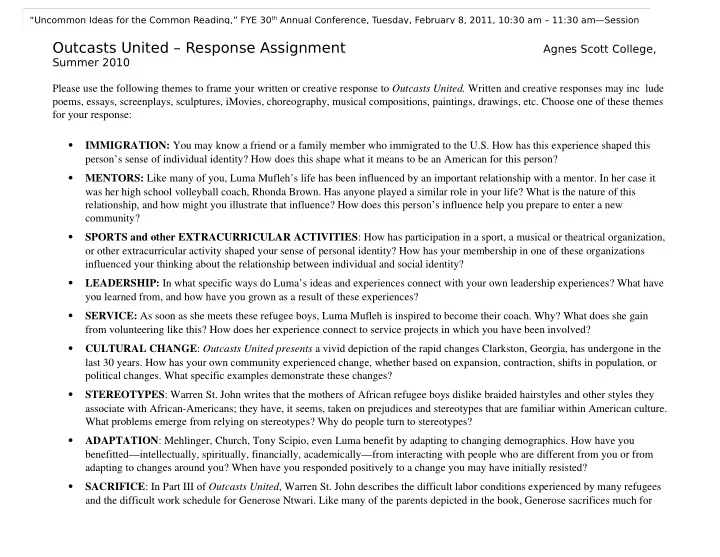

“Uncommon Ideas for the Common Reading,” FYE 30 th Annual Conference, T uesday, February 8, 2011, 10:30 am – 11:30 am—Session Outcasts United – Response Assignment Agnes Scott College, Summer 2010 Please use the following themes to frame your written or creative response to Outcasts United. Written and creative responses may inc lude poems, essays, screenplays, sculptures, iMovies, choreography, musical compositions, paintings, drawings, etc. Choose one of these themes for your response: IMMIGRATION: You may know a friend or a family member who immigrated to the U.S. How has this experience shaped this person’s sense of individual identity? How does this shape what it means to be an American for this person? MENTORS: Like many of you, Luma Mufleh’s life has been influenced by an important relationship with a mentor. In her case it was her high school volleyball coach, Rhonda Brown. Has anyone played a similar role in your life? What is the nature of this relationship, and how might you illustrate that influence? How does this person’s influence help you prepare to enter a new community? SPORTS and other EXTRACURRICULAR ACTIVITIES : How has participation in a sport, a musical or theatrical organization, or other extracurricular activity shaped your sense of personal identity? How has your membership in one of these organizations influenced your thinking about the relationship between individual and social identity? LEADERSHIP: In what specific ways do Luma’s ideas and experiences connect with your own leadership experiences? What have you learned from, and how have you grown as a result of these experiences? SERVICE: As soon as she meets these refugee boys, Luma Mufleh is inspired to become their coach. Why? What does she gain from volunteering like this? How does her experience connect to service projects in which you have been involved? CULTURAL CHANGE : Outcasts United presents a vivid depiction of the rapid changes Clarkston, Georgia, has undergone in the last 30 years. How has your own community experienced change, whether based on expansion, contraction, shifts in population, or political changes. What specific examples demonstrate these changes? STEREOTYPES : Warren St. John writes that the mothers of African refugee boys dislike braided hairstyles and other styles they associate with African-Americans; they have, it seems, taken on prejudices and stereotypes that are familiar within American culture. What problems emerge from relying on stereotypes? Why do people turn to stereotypes? ADAPTATION : Mehlinger, Church, Tony Scipio, even Luma benefit by adapting to changing demographics. How have you benefitted—intellectually, spiritually, financially, academically—from interacting with people who are different from you or from adapting to changes around you? When have you responded positively to a change you may have initially resisted? SACRIFICE : In Part III of Outcasts United , Warren St. John describes the difficult labor conditions experienced by many refugees and the difficult work schedule for Generose Ntwari. Like many of the parents depicted in the book, Generose sacrifices much for
her children. In what ways does the notion of sacrifice play a part in your life? How have the sacrifices of those around you helped you get where you are today? What personal sacrifices have you made, or would you be willing to make, for family members?
Scottj ttje Sidekick Book Discussion Prior planning prevents poor performance! Before leading the discussion of Outcasts United with your group consider these suggestjons: 1. READ THE BOOK! You can’t lead a good discussion if you don’t know what you are talking about. This is not the tjme to demonstrate how to breeze through without doing the reading. AND it’s a matuer of honor and honesty! 2. Do your homework. Read up on the resources provided for the students – the study guide, the blog, the questjon prompts for the assignment. You may want to use some of the questjons with your group. Follow the links from this page: htup://agnesscotu.edu/admission/undergraduate/accepted/fjrstyearbook.aspx 3. Make connectj tjons. Mentjon the book discussion at your fjrst meetjng with the students. Then consider emailing the group before the discussion and ask them to come prepared to talk about the project they did and let them know what you are expectjng from them – this is especially helpful for internatjonal students!! 4. Ask each student to talk about their reactj tjon project. This is the best way to start the discussion. Have each student in your group describe what they did for the required reactjon to the reading. This connects the projects with the book discussion. 5. Make connectj tjons with the book. Find something that is meaningful to YOU to talk about. If you had to do the reactjon project what would you do? Mark a page and read it aloud. Introduce it by saying “This was one of my favorite parts…” 6. Prepare a few prompts. Come up with some questjons that will give you some insight into the individuals in your group. “Do you play on a team?” “Have you worked with refugee communitjes?” “What afgected you most about Luma’s experience?” Do the projects that those in your group have completed tell you something about someone in the group that could serve to keep the conversatjon going? 7. Let it roll. If conversatjon starts about an aspect of the book, let it fmow. Allow for difgerences of opinion – make a ground rule of keeping it polite, but fjnd space for dissent. Let them talk – but a litule silence is okay too. Bring the focus back to the book if it drifus ofg into a tangent. Use another prompt to refocus the group’s atuentjon. 8. End with an overall. “Why do you think we read this?” “Raise your hand if you liked it.” Ask them to explain why they liked it. Ask if there’s anyone who wants to talk about why they didn’t like it.
Recommend
More recommend